Unit 8 Natural disasters (单元教案)
文档属性
| 名称 | Unit 8 Natural disasters (单元教案) | 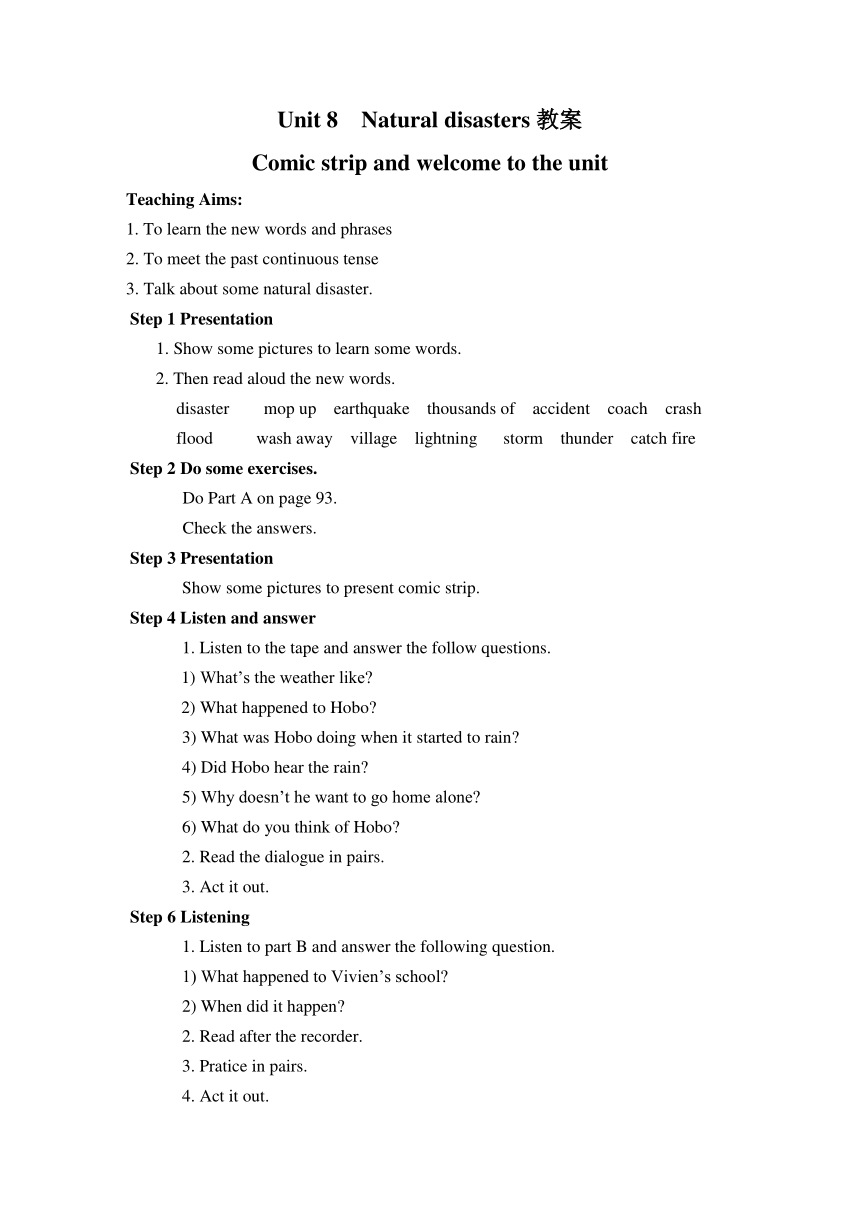 | |
| 格式 | zip | ||
| 文件大小 | 26.9KB | ||
| 资源类型 | 教案 | ||
| 版本资源 | 牛津译林版 | ||
| 科目 | 英语 | ||
| 更新时间 | 2013-12-28 19:19:29 | ||
图片预览

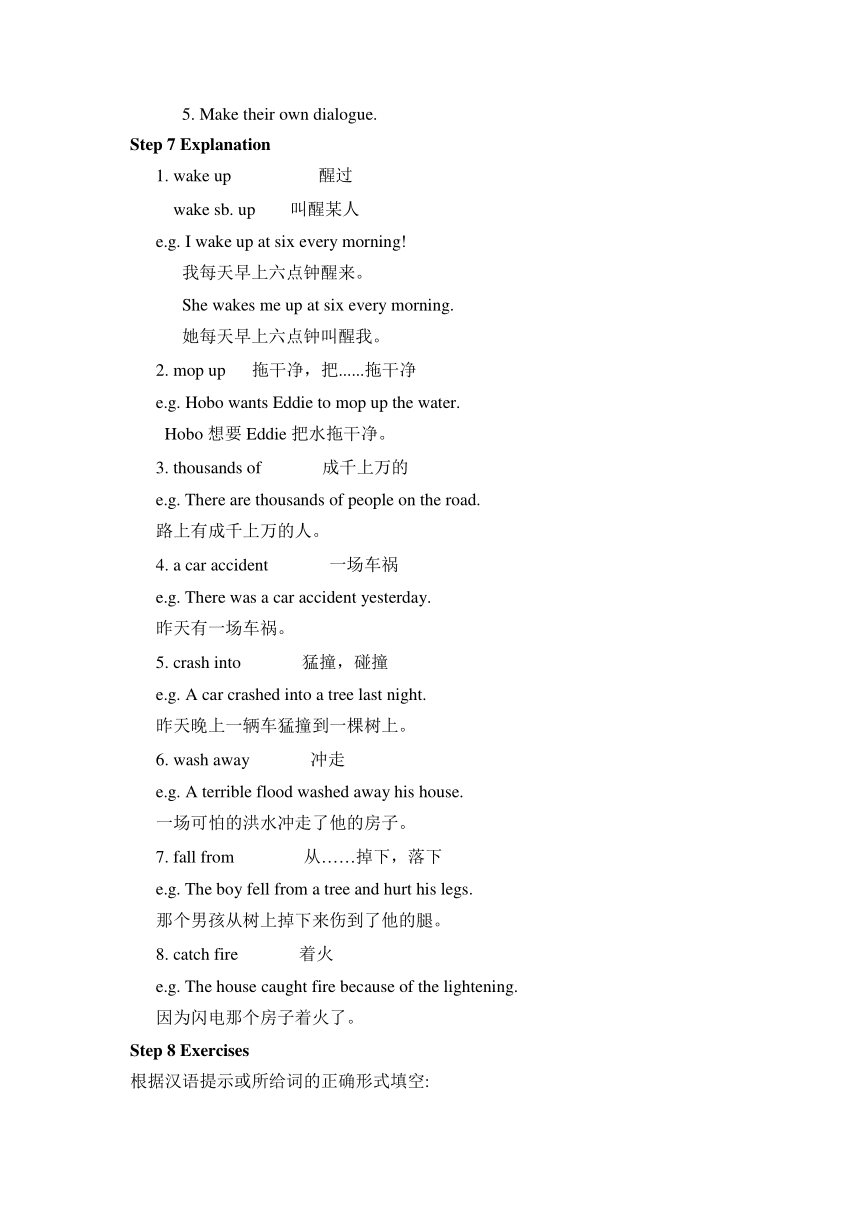
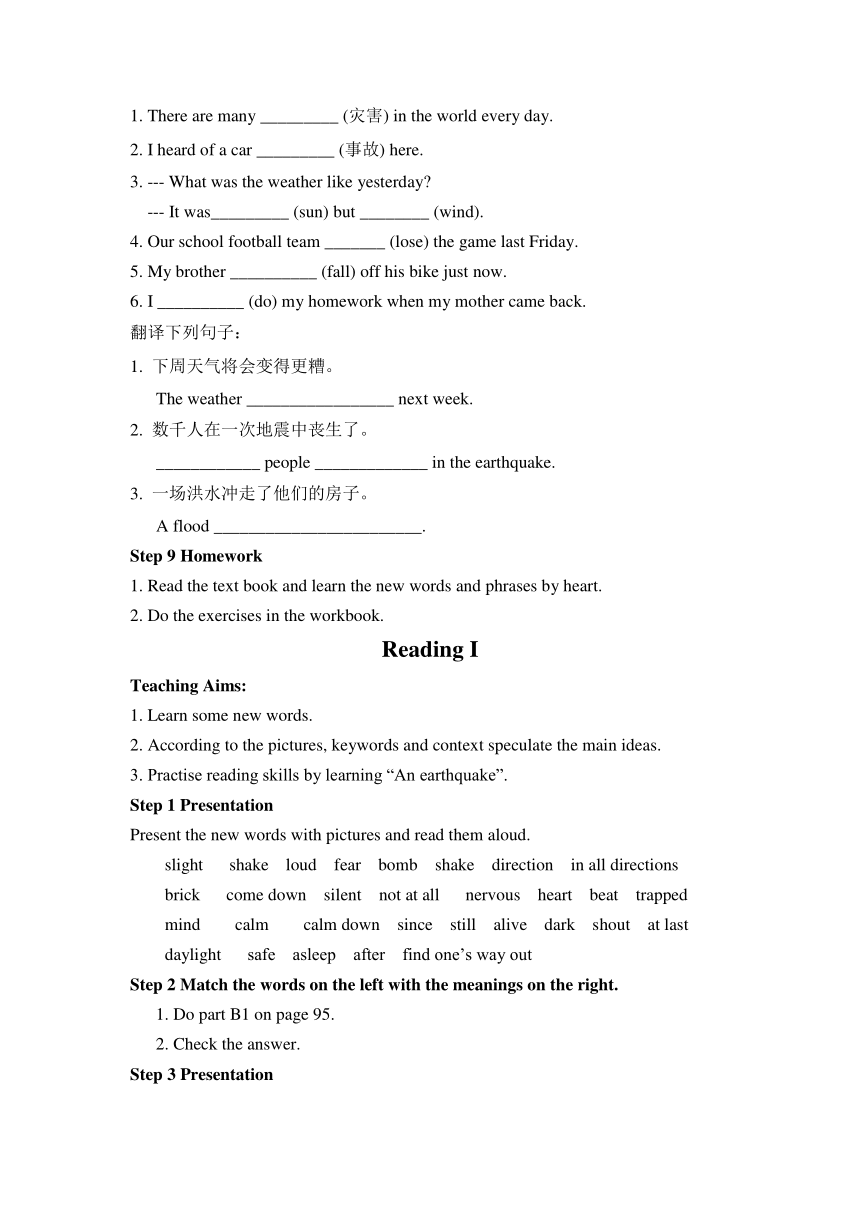
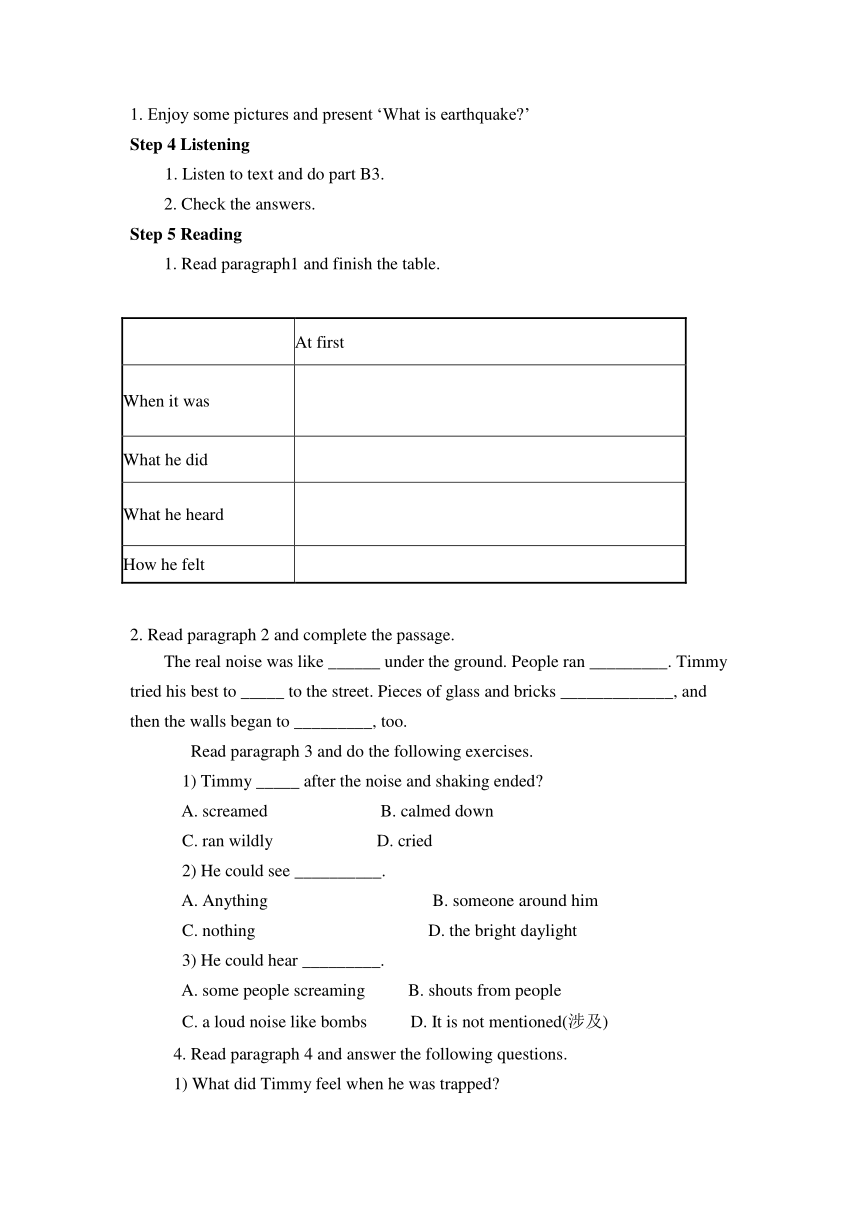
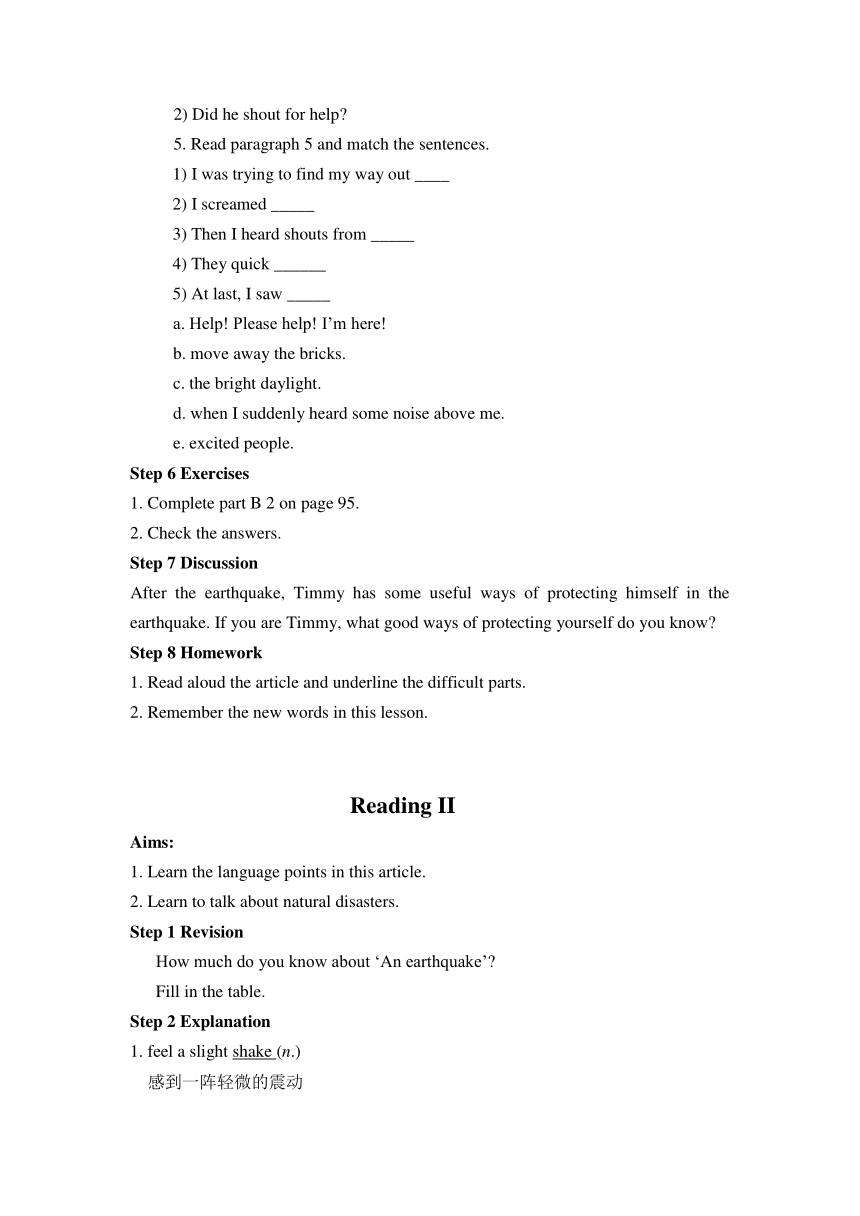
文档简介
Unit 8 Natural disasters教案
Comic strip and welcome to the unit
Teaching Aims:
1. To learn the new words and phrases
2. To meet the past continuous tense
3. Talk about some natural disaster.
Step 1 Presentation
1. Show some pictures to learn some words.
2. Then read aloud the new words.
disaster mop up earthquake thousands of accident coach crash
flood wash away village lightning storm thunder catch fire
Step 2 Do some exercises.
Do Part A on page 93.
Check the answers.
Step 3 Presentation
Show some pictures to present comic strip.
Step 4 Listen and answer
1. Listen to the tape and answer the follow questions.
1) What’s the weather like
2) What happened to Hobo
3) What was Hobo doing when it started to rain
4) Did Hobo hear the rain
5) Why doesn’t he want to go home alone
6) What do you think of Hobo
2. Read the dialogue in pairs.
3. Act it out.
Step 6 Listening
1. Listen to part B and answer the following question.
1) What happened to Vivien’s school
2) When did it happen
2. Read after the recorder.
3. Pratice in pairs.
4. Act it out.
5. Make their own dialogue.
Step 7 Explanation
1. wake up 醒过
wake sb. up 叫醒某人
e.g. I wake up at six every morning!
我每天早上六点钟醒来。
She wakes me up at six every morning.
她每天早上六点钟叫醒我。
2. mop up 拖干净,把......拖干净
e.g. Hobo wants Eddie to mop up the water.
Hobo想要Eddie把水拖干净。
3. thousands of 成千上万的
e.g. There are thousands of people on the road.
路上有成千上万的人。
4. a car accident 一场车祸
e.g. There was a car accident yesterday.
昨天有一场车祸。
5. crash into 猛撞,碰撞
e.g. A car crashed into a tree last night.
昨天晚上一辆车猛撞到一棵树上。
6. wash away 冲走
e.g. A terrible flood washed away his house.
一场可怕的洪水冲走了他的房子。
7. fall from 从……掉下,落下
e.g. The boy fell from a tree and hurt his legs.
那个男孩从树上掉下来伤到了他的腿。
8. catch fire 着火
e.g. The house caught fire because of the lightening.
因为闪电那个房子着火了。
Step 8 Exercises
根据汉语提示或所给词的正确形式填空:
1. There are many _________ (灾害) in the world every day.
2. I heard of a car _________ (事故) here.
3. --- What was the weather like yesterday
--- It was_________ (sun) but ________ (wind).
4. Our school football team _______ (lose) the game last Friday.
5. My brother __________ (fall) off his bike just now.
6. I __________ (do) my homework when my mother came back.
翻译下列句子:
1. 下周天气将会变得更糟。
The weather _________________ next week.
2. 数千人在一次地震中丧生了。
____________ people _____________ in the earthquake.
3. 一场洪水冲走了他们的房子。
A flood ________________________.
Step 9 Homework
1. Read the text book and learn the new words and phrases by heart.
2. Do the exercises in the workbook.
Reading I
Teaching Aims:
1. Learn some new words.
2. According to the pictures, keywords and context speculate the main ideas.
3. Practise reading skills by learning “An earthquake”.
Step 1 Presentation
Present the new words with pictures and read them aloud.
slight shake loud fear bomb shake direction in all directions
brick come down silent not at all nervous heart beat trapped
mind calm calm down since still alive dark shout at last
daylight safe asleep after find one’s way out
Step 2 Match the words on the left with the meanings on the right.
1. Do part B1 on page 95.
2. Check the answer.
Step 3 Presentation
1. Enjoy some pictures and present ‘What is earthquake ’
Step 4 Listening
1. Listen to text and do part B3.
2. Check the answers.
Step 5 Reading
1. Read paragraph1 and finish the table.
At first
When it was
What he did
What he heard
How he felt
2. Read paragraph 2 and complete the passage.
The real noise was like ______ under the ground. People ran _________. Timmy tried his best to _____ to the street. Pieces of glass and bricks _____________, and then the walls began to _________, too.
Read paragraph 3 and do the following exercises.
1) Timmy _____ after the noise and shaking ended
A. screamed B. calmed down
C. ran wildly D. cried
2) He could see __________.
A. Anything B. someone around him
C. nothing D. the bright daylight
3) He could hear _________.
A. some people screaming B. shouts from people
C. a loud noise like bombs D. It is not mentioned(涉及)
4. Read paragraph 4 and answer the following questions.
1) What did Timmy feel when he was trapped
2) Did he shout for help
5. Read paragraph 5 and match the sentences.
1) I was trying to find my way out ____
2) I screamed _____
3) Then I heard shouts from _____
4) They quick ______
5) At last, I saw _____
a. Help! Please help! I’m here!
b. move away the bricks.
c. the bright daylight.
d. when I suddenly heard some noise above me.
e. excited people.
Step 6 Exercises
1. Complete part B 2 on page 95.
2. Check the answers.
Step 7 Discussion
After the earthquake, Timmy has some useful ways of protecting himself in the earthquake. If you are Timmy, what good ways of protecting yourself do you know
Step 8 Homework
1. Read aloud the article and underline the difficult parts.
2. Remember the new words in this lesson.
Reading II
Aims:
1. Learn the language points in this article.
2. Learn to talk about natural disasters.
Step 1 Revision
How much do you know about ‘An earthquake’
Fill in the table.
Step 2 Explanation
1. feel a slight shake (n.)
感到一阵轻微的震动
e.g. We felt a slight shake when the earthquake started.
当地震开始的时候我们感到一阵轻微的震动。
2. start to shake (vt.) 开始摇动
e.g. The earth started to shake when the earthquake began.
当地震开始时地球开始摇动。
3. in fear 害怕地,恐惧地
相似的结构还有:
in trouble 有麻烦的
in need 需要帮助的
in danger 处于危险之中
in hunger 饥饿的
e.g. People screamed in fear.
人们害怕地尖叫起来。
e.g. They got lost in the forest. They had to try different ways in fear.
他们在森林里迷路了,他们不得不害怕地尝试不同的路。
4. run out of … 从……跑出
e.g. Some students run out of the classroom.
一些学生从教室里跑出来。
5. run in all directions 跑向四面八方
e.g. People ran in all directions.
人们跑向四面八方。
6. come down 崩塌,坍塌
e.g. The walls began to come down.
墙开始坍塌了。
7. feel nervous 感到紧张
8. beat fast 跳的快
e.g. He felt nervous and his heart was beating fast.
他感到紧张并且他的心跳的很快。
9. calm down 冷静下来,平静下来
calm v. 使平静,使镇静
n. 平静,宁静
adj. 平静的,镇静的
e.g. I’m nervous, but I told myself to calm down.
我很紧张,但是我告诉自己要平静下来。
e.g. I must keep calm.
我必须要保持冷静。
10. find one’s way out 找到出路
e.g. He wants to find his way out.
他想要找到出路。
11. move away 搬走,移走
e.g. They quickly move away the bricks.
他们快速的搬走了砖块。
Step 3 Do some exercises
一、根据句意和首字母提示补全单词,使句子完整、通顺。
1. The two old friends s_____ hands hard when they met in the street.
2. Most buildings in this area are made of b________ and stones.
3. The girl was full of f_____ when the earthquake started.
4. I tried to c______ down, but I was still frightened.
5. Kate began to s_____ when she saw a worm in her book.
二、Find the following phrases from the text.
起初
惊恐地
在地下
向四处跑
玻璃的碎片和砖块
开始倒塌
冷静下来
三、Fill in the blanks.
1. Frightened by the loud noise, the children looked at each other ________ (害怕地).
2. The small animals in the forest __________________ (四处逃窜) when they saw a tiger coming.
3. We _________________ (正在尽全力) to protect wild animals.
4. The fans _______________(疯狂尖叫) all the time during the concert.
5. I _____________ (平静下来) after listening to the beautiful music.
6. Five workers ____________ (被困) in the mine for 10 hours last month.
四、Translation
1. 地震开始的时候,她正在购物。
2. 人们在跑向四面八方,一块块的玻璃和砖块直往下掉。
3. 我正在努力找出路时,这时突然听到我的上方有声音。
4. 我听到了兴奋的人们的呼喊声。
Step 4 Homework
1. Recite this article.
2. Remember the language points in this lesson.
Grammar
Teaching aims:
1. To recognize the past continuous tense.
2. To become familiar with the of structure of the past continuous tense
3. To recognize the past continuous tense with ‘while’ and ‘when’ and ‘as’
4. To become familiar with the structure of the past continuous tense with ‘while’ and ‘when’ and ‘as’.
Step 1 Presentation
Enjoy the picture and present the present continuous tense.
Step 2 Lead-in
Enjoy more pictures and talk about the past continuous tense.
Step 3 Explanation
1. 过去进行时主要表示:
在过去某一时刻正在进行的动作
(a) They were eating breakfast at 7:00 a.m.yesterday.
(b) I was writing a letter at this time yesterday.
(c) Five minutes ago, Danny was looking out of the window and Suzy was reading a book.
在过去某段时间一直在进行的动作
(a) From 1983 to 1998, he was teaching at Yale.
(b) They were building a dam last winter.
2. 过去进行时的句式
(1)基本结构:was / were + V-ing
(2)肯定句: 主语+was / were + V-ing
(3)否定句:was / were not + V-ing
was not = wasn’t
were not = weren’t
(4)疑问句:将 was/were 调到主语前
(5)特殊疑问句:疑问词+was/were +主语 +V-ing…
Step 4 Exercises
Complete the conversation on page 97.
Check the answers.
Step 5 Presentation
Show some sentences and present the usage of ‘when’ / ‘while’ / ‘as’.
Step 6 Explanation
while, when and as都表示“当……的时候”。
1. 当连接同时发生的两个延续性/长动作时,常用while引导。
e.g. While I was watching TV, he was listening to music.
Millie was reading a book while Eddie was sleeping.
2. 如果短暂性的动作是主句时,我们可以用when, while 或as 引导。
e.g. When/while/as Millie was watching TV, Andy came into the room.
3. 如果延续性的动作是主句时,我们经常用when 来连接。
e.g. Millie was watching TV when Andy came into the room.
4. 如果两个短暂性的动作同时发生,我们通常用as 连接。
e.g. As Millie sat down on the sofa, Andy came into the room.
注:当一个短暂性动作发生的同时伴随着一个延续性的动作,这时我们通常用过去进行时来表示延续性的动作,用一般过去时来表示短暂性的动作。
Step 7 Exercises
Do the exercises on page 98.
Check the answers.
Do more exercises.
Homework
1. Remember the new words in this lesson.
2. Do the exercises on the workbook.
Integrated skills
Aims:
1. Learn some new words.
2. Practise listening skills by listening to a text.
Step 1 Revision
1. Choose the best answer
2. Check the answers
Step 2 Presentation
1. Present the new words.
2. Read aloud these new words:
3. Show some pictures and present some useful telephone number.
4. Do part A1 on page 99.
Step 3 Listening
1. Listen to the recorder and complete A2 on page 99.
2. Check the answers.
3. Listen to the recorder and complete A3 on page 100.
4. Check the answers.
Step 4 Speak up
Listen to the conversation B on page 100.
Answer the questions.
Step 5 Explanation
1. as soon as possible 尽可能快
e.g. She tries to get out as soon as possible.
她试着尽可能快的出来。
2. cover your mouth and nose with a wet towel
用湿毛巾捂住你的嘴巴和鼻子
3. on railways 在铁路上
e.g. Don’t ride your bike on railways.
不要在铁路上骑自行车。
4. keep one’s safe from …
使某人的安全远离 ……
e.g. We must keep ourselves safe from fire.
我们必须要使我们自己的安全远离火。
5. be on fire 着火
e.g. The building is on fire.
那栋大楼着火了。
6. stay away from … 远离……
e.g. Please stay away from drugs.
请远离毒品。
Step 6 Exercises
1. Fill in the blanks with 110 120 119 114 121.
2. 翻译句子:
1. 用一条湿毛巾捂住你的嘴巴和鼻子。
2. 坐在铁路上是很危险的。
3. 如果房子着火了我们应该怎么做。
4. 我们要遵守交通规则。
Homework
1. Remember the new words and the language points in this lesson.
2. Preview the next lesson.
Study skills
Teaching aims:
1. Learn how to talk about abilities.
2. Learn how to use a library.
Step1 Revision
翻译句子:
1. 用一条湿毛巾捂住你的嘴巴和鼻子。
2. 坐在铁路上是很危险的。
3. 如果房子着火了我们应该怎么做。
4. 我们要遵守交通规则。
Step 2 Presentation
1. Present some new words with pictures and read them aloud.
2. Show some pictures and present combining words.
Step 3 Explanation
单词的来源大致上分为五种:
1)基本词 (base)
2)合成词 (combining words)
3)缩略词 (shortening words)
4)拼缀词 (blending words)
5)转类词 (shifting words)
合成词
包括派生词(derivation)和复合词(compounding words)。
所谓的复合词是将两个或者两个以上的词按照一定的次序排列构成的新词。我们只要认识作为成分的基本词,再结合上下文的语境,就不难推测出新词的意义。
2. Complete the exercises A, B on page101.
3. Check the answers.
4. Make new compound words as many as you can.
Step 4 Exercises
一、根据提示写单词。
1. We should follow traffic ______(规则).
2.There is a _______ (铁路) station in Yancheng.
3. He is making p_______ at home.
4. What should we do when we b______ ourselves.
5. Does he usually do h_________ at home
Homework
1. Remember the new words and the language points in this lesson.
2. Recite the conversation in speak-up.
Task
Teaching aims:
To learn to organize ideas for writing an article for the school newsletter and to write an article about natural disasters
Step 1 Revision
Show some videos and pictures to revise some natural disasters.
Step 2 Reading
1. Read the books by themselves.
2. Learn some useful expressions.
3. Complete the exercises on page103.
Step 3 Explanation
1. tell sb. (not) to do sth.
告诉某人(不要)做某事
e.g. Mr. Wu told us to go home early.
吴老师告诉我们要早点回家。
2. share sth. with sb.
与某人分享某物
e.g. I share a bedroom with my sister.
我和妹妹共同用一个卧室。
3. keep doing sth. 一直(做)某事
e.g. The snow kept falling.
雪一直在下。
4. hear … doing sth. 听到…...在做某事
e.g. He heard a child crying next door.
他听到隔壁一个孩子在哭。
hear the noise of
e.g. I heard the noise of traffic last night.
5. get on / off 上/下车
e.g. She got on a bus quickly.
她快速的上了一辆公共汽车。
6. fall over 摔倒、跌倒
e.g. I nearly fell over in the snow.
我几乎在雪中摔倒。
7. clean the snow 清理雪
e.g. She cleaned the snow yesterday.
她昨天清理雪了。
Step 5 How to write about natural disasters
1. Choose the topic
定题
2. Choose materials
选材
3. Make the list
列提纲
4. Start to write
着手写作
5. Write the introduction part
6. During the disaster
a. What did you do
1) wore more clothes/rain coat/glasses
2) called 110/119/120 hotline
3) closed the door and windows
4) went to high places …
b. What did you hear
heard strong wind/big noise/ thunder
c. What did you see
saw the lightning/lots of smoke/sand /
dark cloud/thick snow/ many people…
d. What happened
1) be trapped/be frightened
2) lost my umbrella
3) walked/drove/rode---slowly/hard
4) fell down/over
5) crashed into …
7. After the disaster
1) What did you see
saw people removing the snow/cleaned
the way/ sent the victims to the hospital/
got something from the flood---
2) What did you hear
screamed / shouted / calmed down …
3) How did you feel
frightened /excited/terrible/in fear/
worried / sad/ thankful …
Step 6 Writing
Try to write an article.
Play a game. Try to find out the mistakes.
Show some of their articles.
Homework
Review all the new words and language points in this unit.
Comic strip and welcome to the unit
Teaching Aims:
1. To learn the new words and phrases
2. To meet the past continuous tense
3. Talk about some natural disaster.
Step 1 Presentation
1. Show some pictures to learn some words.
2. Then read aloud the new words.
disaster mop up earthquake thousands of accident coach crash
flood wash away village lightning storm thunder catch fire
Step 2 Do some exercises.
Do Part A on page 93.
Check the answers.
Step 3 Presentation
Show some pictures to present comic strip.
Step 4 Listen and answer
1. Listen to the tape and answer the follow questions.
1) What’s the weather like
2) What happened to Hobo
3) What was Hobo doing when it started to rain
4) Did Hobo hear the rain
5) Why doesn’t he want to go home alone
6) What do you think of Hobo
2. Read the dialogue in pairs.
3. Act it out.
Step 6 Listening
1. Listen to part B and answer the following question.
1) What happened to Vivien’s school
2) When did it happen
2. Read after the recorder.
3. Pratice in pairs.
4. Act it out.
5. Make their own dialogue.
Step 7 Explanation
1. wake up 醒过
wake sb. up 叫醒某人
e.g. I wake up at six every morning!
我每天早上六点钟醒来。
She wakes me up at six every morning.
她每天早上六点钟叫醒我。
2. mop up 拖干净,把......拖干净
e.g. Hobo wants Eddie to mop up the water.
Hobo想要Eddie把水拖干净。
3. thousands of 成千上万的
e.g. There are thousands of people on the road.
路上有成千上万的人。
4. a car accident 一场车祸
e.g. There was a car accident yesterday.
昨天有一场车祸。
5. crash into 猛撞,碰撞
e.g. A car crashed into a tree last night.
昨天晚上一辆车猛撞到一棵树上。
6. wash away 冲走
e.g. A terrible flood washed away his house.
一场可怕的洪水冲走了他的房子。
7. fall from 从……掉下,落下
e.g. The boy fell from a tree and hurt his legs.
那个男孩从树上掉下来伤到了他的腿。
8. catch fire 着火
e.g. The house caught fire because of the lightening.
因为闪电那个房子着火了。
Step 8 Exercises
根据汉语提示或所给词的正确形式填空:
1. There are many _________ (灾害) in the world every day.
2. I heard of a car _________ (事故) here.
3. --- What was the weather like yesterday
--- It was_________ (sun) but ________ (wind).
4. Our school football team _______ (lose) the game last Friday.
5. My brother __________ (fall) off his bike just now.
6. I __________ (do) my homework when my mother came back.
翻译下列句子:
1. 下周天气将会变得更糟。
The weather _________________ next week.
2. 数千人在一次地震中丧生了。
____________ people _____________ in the earthquake.
3. 一场洪水冲走了他们的房子。
A flood ________________________.
Step 9 Homework
1. Read the text book and learn the new words and phrases by heart.
2. Do the exercises in the workbook.
Reading I
Teaching Aims:
1. Learn some new words.
2. According to the pictures, keywords and context speculate the main ideas.
3. Practise reading skills by learning “An earthquake”.
Step 1 Presentation
Present the new words with pictures and read them aloud.
slight shake loud fear bomb shake direction in all directions
brick come down silent not at all nervous heart beat trapped
mind calm calm down since still alive dark shout at last
daylight safe asleep after find one’s way out
Step 2 Match the words on the left with the meanings on the right.
1. Do part B1 on page 95.
2. Check the answer.
Step 3 Presentation
1. Enjoy some pictures and present ‘What is earthquake ’
Step 4 Listening
1. Listen to text and do part B3.
2. Check the answers.
Step 5 Reading
1. Read paragraph1 and finish the table.
At first
When it was
What he did
What he heard
How he felt
2. Read paragraph 2 and complete the passage.
The real noise was like ______ under the ground. People ran _________. Timmy tried his best to _____ to the street. Pieces of glass and bricks _____________, and then the walls began to _________, too.
Read paragraph 3 and do the following exercises.
1) Timmy _____ after the noise and shaking ended
A. screamed B. calmed down
C. ran wildly D. cried
2) He could see __________.
A. Anything B. someone around him
C. nothing D. the bright daylight
3) He could hear _________.
A. some people screaming B. shouts from people
C. a loud noise like bombs D. It is not mentioned(涉及)
4. Read paragraph 4 and answer the following questions.
1) What did Timmy feel when he was trapped
2) Did he shout for help
5. Read paragraph 5 and match the sentences.
1) I was trying to find my way out ____
2) I screamed _____
3) Then I heard shouts from _____
4) They quick ______
5) At last, I saw _____
a. Help! Please help! I’m here!
b. move away the bricks.
c. the bright daylight.
d. when I suddenly heard some noise above me.
e. excited people.
Step 6 Exercises
1. Complete part B 2 on page 95.
2. Check the answers.
Step 7 Discussion
After the earthquake, Timmy has some useful ways of protecting himself in the earthquake. If you are Timmy, what good ways of protecting yourself do you know
Step 8 Homework
1. Read aloud the article and underline the difficult parts.
2. Remember the new words in this lesson.
Reading II
Aims:
1. Learn the language points in this article.
2. Learn to talk about natural disasters.
Step 1 Revision
How much do you know about ‘An earthquake’
Fill in the table.
Step 2 Explanation
1. feel a slight shake (n.)
感到一阵轻微的震动
e.g. We felt a slight shake when the earthquake started.
当地震开始的时候我们感到一阵轻微的震动。
2. start to shake (vt.) 开始摇动
e.g. The earth started to shake when the earthquake began.
当地震开始时地球开始摇动。
3. in fear 害怕地,恐惧地
相似的结构还有:
in trouble 有麻烦的
in need 需要帮助的
in danger 处于危险之中
in hunger 饥饿的
e.g. People screamed in fear.
人们害怕地尖叫起来。
e.g. They got lost in the forest. They had to try different ways in fear.
他们在森林里迷路了,他们不得不害怕地尝试不同的路。
4. run out of … 从……跑出
e.g. Some students run out of the classroom.
一些学生从教室里跑出来。
5. run in all directions 跑向四面八方
e.g. People ran in all directions.
人们跑向四面八方。
6. come down 崩塌,坍塌
e.g. The walls began to come down.
墙开始坍塌了。
7. feel nervous 感到紧张
8. beat fast 跳的快
e.g. He felt nervous and his heart was beating fast.
他感到紧张并且他的心跳的很快。
9. calm down 冷静下来,平静下来
calm v. 使平静,使镇静
n. 平静,宁静
adj. 平静的,镇静的
e.g. I’m nervous, but I told myself to calm down.
我很紧张,但是我告诉自己要平静下来。
e.g. I must keep calm.
我必须要保持冷静。
10. find one’s way out 找到出路
e.g. He wants to find his way out.
他想要找到出路。
11. move away 搬走,移走
e.g. They quickly move away the bricks.
他们快速的搬走了砖块。
Step 3 Do some exercises
一、根据句意和首字母提示补全单词,使句子完整、通顺。
1. The two old friends s_____ hands hard when they met in the street.
2. Most buildings in this area are made of b________ and stones.
3. The girl was full of f_____ when the earthquake started.
4. I tried to c______ down, but I was still frightened.
5. Kate began to s_____ when she saw a worm in her book.
二、Find the following phrases from the text.
起初
惊恐地
在地下
向四处跑
玻璃的碎片和砖块
开始倒塌
冷静下来
三、Fill in the blanks.
1. Frightened by the loud noise, the children looked at each other ________ (害怕地).
2. The small animals in the forest __________________ (四处逃窜) when they saw a tiger coming.
3. We _________________ (正在尽全力) to protect wild animals.
4. The fans _______________(疯狂尖叫) all the time during the concert.
5. I _____________ (平静下来) after listening to the beautiful music.
6. Five workers ____________ (被困) in the mine for 10 hours last month.
四、Translation
1. 地震开始的时候,她正在购物。
2. 人们在跑向四面八方,一块块的玻璃和砖块直往下掉。
3. 我正在努力找出路时,这时突然听到我的上方有声音。
4. 我听到了兴奋的人们的呼喊声。
Step 4 Homework
1. Recite this article.
2. Remember the language points in this lesson.
Grammar
Teaching aims:
1. To recognize the past continuous tense.
2. To become familiar with the of structure of the past continuous tense
3. To recognize the past continuous tense with ‘while’ and ‘when’ and ‘as’
4. To become familiar with the structure of the past continuous tense with ‘while’ and ‘when’ and ‘as’.
Step 1 Presentation
Enjoy the picture and present the present continuous tense.
Step 2 Lead-in
Enjoy more pictures and talk about the past continuous tense.
Step 3 Explanation
1. 过去进行时主要表示:
在过去某一时刻正在进行的动作
(a) They were eating breakfast at 7:00 a.m.yesterday.
(b) I was writing a letter at this time yesterday.
(c) Five minutes ago, Danny was looking out of the window and Suzy was reading a book.
在过去某段时间一直在进行的动作
(a) From 1983 to 1998, he was teaching at Yale.
(b) They were building a dam last winter.
2. 过去进行时的句式
(1)基本结构:was / were + V-ing
(2)肯定句: 主语+was / were + V-ing
(3)否定句:was / were not + V-ing
was not = wasn’t
were not = weren’t
(4)疑问句:将 was/were 调到主语前
(5)特殊疑问句:疑问词+was/were +主语 +V-ing…
Step 4 Exercises
Complete the conversation on page 97.
Check the answers.
Step 5 Presentation
Show some sentences and present the usage of ‘when’ / ‘while’ / ‘as’.
Step 6 Explanation
while, when and as都表示“当……的时候”。
1. 当连接同时发生的两个延续性/长动作时,常用while引导。
e.g. While I was watching TV, he was listening to music.
Millie was reading a book while Eddie was sleeping.
2. 如果短暂性的动作是主句时,我们可以用when, while 或as 引导。
e.g. When/while/as Millie was watching TV, Andy came into the room.
3. 如果延续性的动作是主句时,我们经常用when 来连接。
e.g. Millie was watching TV when Andy came into the room.
4. 如果两个短暂性的动作同时发生,我们通常用as 连接。
e.g. As Millie sat down on the sofa, Andy came into the room.
注:当一个短暂性动作发生的同时伴随着一个延续性的动作,这时我们通常用过去进行时来表示延续性的动作,用一般过去时来表示短暂性的动作。
Step 7 Exercises
Do the exercises on page 98.
Check the answers.
Do more exercises.
Homework
1. Remember the new words in this lesson.
2. Do the exercises on the workbook.
Integrated skills
Aims:
1. Learn some new words.
2. Practise listening skills by listening to a text.
Step 1 Revision
1. Choose the best answer
2. Check the answers
Step 2 Presentation
1. Present the new words.
2. Read aloud these new words:
3. Show some pictures and present some useful telephone number.
4. Do part A1 on page 99.
Step 3 Listening
1. Listen to the recorder and complete A2 on page 99.
2. Check the answers.
3. Listen to the recorder and complete A3 on page 100.
4. Check the answers.
Step 4 Speak up
Listen to the conversation B on page 100.
Answer the questions.
Step 5 Explanation
1. as soon as possible 尽可能快
e.g. She tries to get out as soon as possible.
她试着尽可能快的出来。
2. cover your mouth and nose with a wet towel
用湿毛巾捂住你的嘴巴和鼻子
3. on railways 在铁路上
e.g. Don’t ride your bike on railways.
不要在铁路上骑自行车。
4. keep one’s safe from …
使某人的安全远离 ……
e.g. We must keep ourselves safe from fire.
我们必须要使我们自己的安全远离火。
5. be on fire 着火
e.g. The building is on fire.
那栋大楼着火了。
6. stay away from … 远离……
e.g. Please stay away from drugs.
请远离毒品。
Step 6 Exercises
1. Fill in the blanks with 110 120 119 114 121.
2. 翻译句子:
1. 用一条湿毛巾捂住你的嘴巴和鼻子。
2. 坐在铁路上是很危险的。
3. 如果房子着火了我们应该怎么做。
4. 我们要遵守交通规则。
Homework
1. Remember the new words and the language points in this lesson.
2. Preview the next lesson.
Study skills
Teaching aims:
1. Learn how to talk about abilities.
2. Learn how to use a library.
Step1 Revision
翻译句子:
1. 用一条湿毛巾捂住你的嘴巴和鼻子。
2. 坐在铁路上是很危险的。
3. 如果房子着火了我们应该怎么做。
4. 我们要遵守交通规则。
Step 2 Presentation
1. Present some new words with pictures and read them aloud.
2. Show some pictures and present combining words.
Step 3 Explanation
单词的来源大致上分为五种:
1)基本词 (base)
2)合成词 (combining words)
3)缩略词 (shortening words)
4)拼缀词 (blending words)
5)转类词 (shifting words)
合成词
包括派生词(derivation)和复合词(compounding words)。
所谓的复合词是将两个或者两个以上的词按照一定的次序排列构成的新词。我们只要认识作为成分的基本词,再结合上下文的语境,就不难推测出新词的意义。
2. Complete the exercises A, B on page101.
3. Check the answers.
4. Make new compound words as many as you can.
Step 4 Exercises
一、根据提示写单词。
1. We should follow traffic ______(规则).
2.There is a _______ (铁路) station in Yancheng.
3. He is making p_______ at home.
4. What should we do when we b______ ourselves.
5. Does he usually do h_________ at home
Homework
1. Remember the new words and the language points in this lesson.
2. Recite the conversation in speak-up.
Task
Teaching aims:
To learn to organize ideas for writing an article for the school newsletter and to write an article about natural disasters
Step 1 Revision
Show some videos and pictures to revise some natural disasters.
Step 2 Reading
1. Read the books by themselves.
2. Learn some useful expressions.
3. Complete the exercises on page103.
Step 3 Explanation
1. tell sb. (not) to do sth.
告诉某人(不要)做某事
e.g. Mr. Wu told us to go home early.
吴老师告诉我们要早点回家。
2. share sth. with sb.
与某人分享某物
e.g. I share a bedroom with my sister.
我和妹妹共同用一个卧室。
3. keep doing sth. 一直(做)某事
e.g. The snow kept falling.
雪一直在下。
4. hear … doing sth. 听到…...在做某事
e.g. He heard a child crying next door.
他听到隔壁一个孩子在哭。
hear the noise of
e.g. I heard the noise of traffic last night.
5. get on / off 上/下车
e.g. She got on a bus quickly.
她快速的上了一辆公共汽车。
6. fall over 摔倒、跌倒
e.g. I nearly fell over in the snow.
我几乎在雪中摔倒。
7. clean the snow 清理雪
e.g. She cleaned the snow yesterday.
她昨天清理雪了。
Step 5 How to write about natural disasters
1. Choose the topic
定题
2. Choose materials
选材
3. Make the list
列提纲
4. Start to write
着手写作
5. Write the introduction part
6. During the disaster
a. What did you do
1) wore more clothes/rain coat/glasses
2) called 110/119/120 hotline
3) closed the door and windows
4) went to high places …
b. What did you hear
heard strong wind/big noise/ thunder
c. What did you see
saw the lightning/lots of smoke/sand /
dark cloud/thick snow/ many people…
d. What happened
1) be trapped/be frightened
2) lost my umbrella
3) walked/drove/rode---slowly/hard
4) fell down/over
5) crashed into …
7. After the disaster
1) What did you see
saw people removing the snow/cleaned
the way/ sent the victims to the hospital/
got something from the flood---
2) What did you hear
screamed / shouted / calmed down …
3) How did you feel
frightened /excited/terrible/in fear/
worried / sad/ thankful …
Step 6 Writing
Try to write an article.
Play a game. Try to find out the mistakes.
Show some of their articles.
Homework
Review all the new words and language points in this unit.
